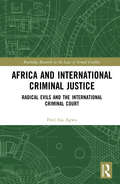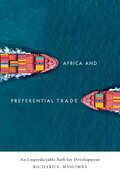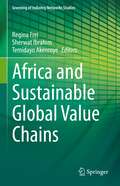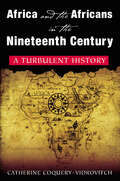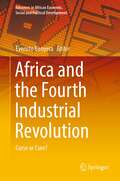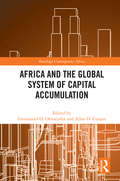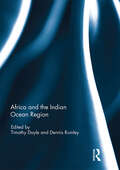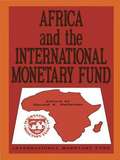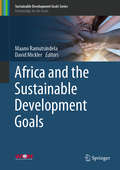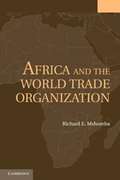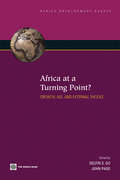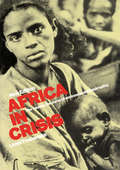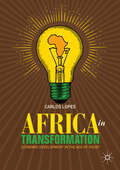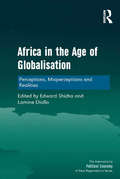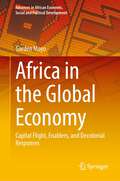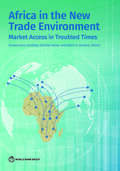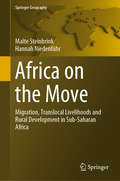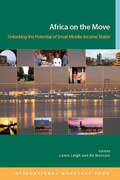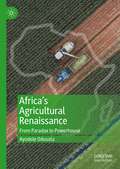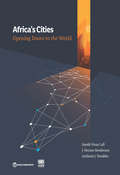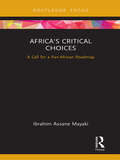- Table View
- List View
Africa and International Criminal Justice: Radical Evils and the International Criminal Court (Routledge Research in the Law of Armed Conflict)
by Fred Aja AgwuThis book provides an overview of crimes under international law, radical evils, in a number of African states. This overview informs a critical analysis of the debates surrounding the African Union’s call for withdrawal from the International Criminal Court and proposes a way forward with a more pertinent role for the Court. The work critically analyzes the arguments around withdrawal from the ICC and the extension of the jurisdiction of the African Court into criminal matters. It is held that this was not intended in the spirit of complementarity as envisaged by the Rome Statute, and is subject to political calculation and manipulation by national governments. Recasting the ICC as a court of second instance would provide a stronger institutional and jurisdictional regime. The book will be a valuable resource for students, academics, and policymakers working in the areas of international humanitarian law, international criminal law, African studies, and genocide studies.
Africa and Preferential Trade: An Unpredictable Path for Development
by Richard E. MshombaNonreciprocal preferential trade arrangements are a defining feature of the relationship between developed and developing countries dating back to the colonial era. In the late 1950s, these arrangements started to take a multilateral form when members of the European Economic Community established special trade arrangements with their colonies. Since then, several trade arrangements have featured African countries among the preference-receiving countries. Yet it is not always clear how preferential these arrangements are and whether they in fact help African countries or instead lead them to perpetual dependence on specific markets and products. Richard E. Mshomba carefully examines the history of these programs and their salient features. He analyzes negotiations between the EU and African countries to form Economic Partnership Agreements. Nonreciprocal preferential trade arrangements are often unpredictable, since the duration and magnitude of preferences are at the discretion of the preference-giving countries. However, when used in conjunction with other development programs and with laws and regulations that encourage long-term investment and protect employees, they can increase economic opportunities and foster human development. This book recognizes the potential impact of nonreciprocal preferential trade arrangements and provides recommendations to increase their viability.
Africa and Sustainable Global Value Chains (Greening of Industry Networks Studies #9)
by Regina Frei Sherwat Ibrahim Temidayo AkenroyeThis book contains a collection of studies on the interactions between businesses in Africa and Global Value Chains (GVCs) in terms of social, environmental and economic sustainability. This is particularly pertinent given the asymmetrical power distribution between the global buyer and the African supplier, their governance relationships and the ongoing competitive pressures to reduce costs and increase flexibility to meet GVC demands. Rather than focusing on the sustainability of a single organization, GVCs address the sustainability of inter-firm value chains and global industries as a whole. With little differentiation between value chain creation and social / environmental degradation extending to people and raw material extraction (upstream) and disposal or recycling (downstream), sustainability issues need to be at the forefront of African business research interests. Nowadays, sustainability is considered a competitive advantage for a firm looking to join a GVC. Whether sustainability is approached from the viewpoint of an exporting firm motivated to join a GVC in its respective industry or whether a firm’s continuing contractual or collaborative relationship with a buyer depends on its compliance with sustainability standards, both approaches focus on the ability of firms in Africa to benefit from joining sustainable GVCs.
Africa and the Africans in the Nineteenth Century: A Turbulent History
by Mary Baker Catherine Coquery-VidrovitchMost histories seek to understand modern Africa as a troubled outcome of nineteenth century European colonialism, but that is only a small part of the story. In this celebrated book, beautifully translated from the French edition, the history of Africa in the nineteenth century unfolds from the perspective of Africans themselves rather than the European powers.It was above all a time of tremendous internal change on the African continent. Great jihads of Muslim conquest and conversion swept over West Africa. In the interior, warlords competed to control the internal slave trade. In the east, the sultanate of Zanzibar extended its reach via coastal and interior trade routes. In the north, Egypt began to modernize while Algeria was colonized. In the south, a series of forced migrations accelerated, spurred by the progression of white settlement.Through much of the century African societies assimilated and adapted to the changes generated by these diverse forces. In the end, the West's technological advantage prevailed and most of Africa fell under European control and lost its independence. Yet only by taking into account the rich complexity of this tumultuous past can we fully understand modern Africa from the colonial period to independence and the difficulties of today.
Africa and the Fourth Industrial Revolution: Curse or Cure? (Advances in African Economic, Social and Political Development)
by Everisto BenyeraThis book examines the epistemological, political, and socio-economic consequences of the Fourth Industrial Revolution (4IR) for Africa. Presenting various case studies on epistemic freedom, theology, race and robotics, tertiary education, political and economic transformation, human capital, and governance, it debates whether the 4IR will be part of the solution to the African problem, namely that of coloniality in its various forms. Solving the African problem using the 4IR requires ethical, just and epistemologically independent leadership. However, the lack of ICT infrastructure militates against Africa’s endeavours to make the 4IR a problem-solving moment. To its credit, Africa possesses some of the major capital needed (human, mineral, and social), and it constitutes a huge market comprising a young population eager to participate in the 4IR as problem-solvers and not as a problem to be solved—as equal citizens and not as the marginalized other.
Africa and the Global System of Capital Accumulation (Routledge Contemporary Africa)
by Emmanuel O. OritsejaforAfrica and the Global System of Capital Accumulation offers a groundbreaking analysis of the strategic role Africa plays in the global capitalist economy. The exploitation of Africa’s rich resources, as well as its labor, make it possible for major world powers to sustain their authority over their own middle-class populations while rewarding African collaborators in leadership positions for subjecting their populations into poverty and desperation. Middle-class obsessions such as computers, mobile phones, cars and the petroleum that fuels them, diamonds, chocolate – all of these products require African resources that are typically obtained by child or slave labor that helps to generate billionaires out of foreign investors while impoverishing most Africans. Oritsejafor and Cooper demonstrate that "primitive accumulation," believed by both Adam Smith and Karl Marx to be a process that precedes capitalism, is actually an integral part of capitalism. They also validate the thesis that capitalism incorporates racism as an organizing tool for the exploitation of labor in Africa and on a global scale. Case studies are presented on Nigeria, Cote d’Ivoire, Ghana, Liberia, Congo, Tanzania, Somalia, Angola, Namibia, Sao Tome and Principe, and South Sudan. There are also chapters analyzing the interests of Russia and China in Africa. This book will be of interest to students and scholars of African politics, development, and economics.
Africa and the Indian Ocean Region
by Timothy Doyle Dennis RumleyThis book examines the presence of Africa as a significant force in the western Indian Ocean. Africa will increasingly play a pivotal role in the future of the geopolitics of the Indian Ocean region. The book considers the scope for greater African involvement in Indian Ocean region-building activities, and seeks to encourage a western Indian Ocean dialogue. The book publishes some of the best papers presented at an Indian Ocean Research Group (IORG Inc.) symposium held in Nairobi, Kenya, in 2013, entitled "The Political Economy of Maritime Africa in the Indian Ocean Region." This symposium was part of a larger project on constructing a sense of "Indian Oceanness". Chapters include: India’s new policy of engagement with Africa; China’s growing presence in the Indian Ocean Region; security strategies in the Western Indian Ocean; the increasing importance and significance of the Western Indian Ocean littoral; and cultural linkages between Africa and the Indian Ocean region. This book was previously published as a special issue of the Journal of the Indian Ocean Region.
Africa and the Sustainable Development Goals (Sustainable Development Goals Series)
by Maano Ramutsindela David MicklerThe book draws upon the expertise and international research collaborations forged by the Worldwide Universities Network Global Africa Group to critically engage with the intersection, in theory and practice, of the Sustainable Development Goals (SDGs) and Africa’s development agendas and needs. Further, it argues that – and demonstrates how – the SDGs should be understood as an aspirational blueprint for development with multiple meanings that are situated in dynamic and contested terrains. As the SDGs have substantial implications for development policy and resourcing at both the macro and micro levels, their relevance is not only context-specific but should also be assessed in terms of the aspirations and needs of ordinary citizens across the continent. Drawing on analyses and evidence from both the natural and social sciences, the book demonstrates that progress towards the SDGs must meet demands for improving human well-being under diverse and challenging socio-economic, political and environmental conditions. Examples include those from the mining industry, public health, employment and the media. In closing, it highlights how international collaboration in the form of research networks can enhance the production of critical knowledge on and engagement with the SDGs in Africa.
Africa and the World Trade Organization
by Richard E. MshombaMshomba provides a systematic study of Africa as it relates to the World Trade Organization. He examines the WTO's enforcement mechanism; the WTO's broadened mandate, illustrated by the Agreement on Trade-Related Intellectual Property Rights; agriculture in the Doha Round; issues relating to transparency in government procurement; and the endeavor to streamline assistance to developing countries through an "Aid for Trade" initiative. The author integrates theory and practice, with a clear presentation of important economic concepts. He provides a rigorous analysis of key issues and proposals. He presents African countries as having an important role to play in the WTO, especially as they actively engage in bargaining through various coalitions. Mshomba acknowledges that WTO negotiations will always be complex and at times contentious due to wide economic and political differences between countries. He views the differences, however, as creating opportunities for a mutually beneficial exchange of goods, services, and ideas.
Africa at a Turning Point? Growth, Aid, and External Shocks
by John Page Delfin Sia GoSince the mid-1990s, sub-Saharan Africa has experienced an acceleration of economic growth that has produced rising incomes and faster human development. However, this growth contrasts with the continent's experience between 1975 and 1995, when it largely missed out on two decades of economic progress. This disparity between Africa's current experience and its history raises questions about the continent's development. Is there a turnaround in Africa's economy? Will growth persist? 'Africa at a Turning Point?' is a collection of essays that analyzes three interrelated aspects of Africa's recent revival. The first set of essays examines Africa's recent growth in the context of its history of growth accelerations and collapses. It seeks to answer such questions as, is Africa at a turning point? Are the economic fundamentals finally pointing toward more sustainable growth? The second set of essays looks at donor flows, which play a large role in Africa's growth. These essays focus on such issues as the management and delivery of increased aid, and the history and volatility of donor flows to Africa. The third set of essays considers the recent impact of one persistent threat to sustained growth in Africa: commodity price shocks, particularly those resulting from fluctuations in oil prices.
Africa in Crisis: The Causes and Cures of Environmental Bankruptcy
by Lloyd TimberlakeThe first edition of this incisive text on the problems of drought and famine facing Africa won worldwide critical acclaim. Revised with a new introduction, Lloyd Timberlake's bestselling study is invaluable reading for anyone interested in Africa.
Africa in Transformation: Economic Development in the Age of Doubt
by Carlos Lopes“Lopes brings his rigour, insight, and experience to this timely new book, presenting a compelling rethink of traditional development models in Africa and the need to seize on transformational change to build a sustainable future for the continent."—Kofi Annan, former United Nations Secretary General “Some readers will enjoy Lopes’ eclectic brilliance and breath-taking culture. Others will salute his ability to bring compelling new angles to every topic. Everyone will be impressed with his craftsmanship, his rich and multi-faceted approach to development, and his high ethical standards. It is impossible to read this jewel book and not feel smarter.”—Célestin Monga, African Development Bank’s Vice President and Chief Economist “Drawing on his distinguished academic career, policy experience at the highest level, and deep love of the continent, Lopes provides a visionary analysis of Africa's current problems and future prospects. This book provides a highly unusual combination of intellectualism and hard-nosed pragmatism. A singular achievement.” —Ha-Joon Chang, University of Cambridge, UK“Thorough, thought-provoking, and beyond rhetoric: definitely a must-read for anyone who wants to understand Africa’s present and future.”—Enrico Letta, former Prime Minister of Italy, Dean of the Paris School of International Affairs, Sciences Po, France Lopes delivers an overview of the critical development issues facing the African continent today. He offers readers a blueprint of policies to address issues, and an intense, heartfelt meditation on the meaning of economic development in the age of democratic doubts, identity crises, global fears and threatening issues of sustainability.
Africa in the Age of Globalisation: Perceptions, Misperceptions and Realities (The International Political Economy of New Regionalisms Series)
by Edward Shizha Lamine DialloThis is a collection of bold and visionary scholarship that reveals an insightful exposition of re-visioning African development from African perspectives. It provides educators, policy makers, social workers, non-governmental agencies, and development agencies with an interdisciplinary conceptual base that can effectively guide them in planning and implementing programs for socio-economic development in Africa. The book provides up-to-date scholarly research on continental trends on various subjects and concerns of paramount importance to globalisation and development in Africa (politics, democracy, education, gender, technology, global relationships and the role of non-governmental organisations). The authors challenge the familiar paradigms in order to show how imperfectly, if at all, assumptions about globalisation and development theories have failed in their depictions and applications to Africa. The scholars in this volume both inform and advocate for a re-visioning of perceptions on Africa and how it navigates global processes.
Africa in the Global Economy: Capital Flight, Enablers, and Decolonial Responses (Advances in African Economic, Social and Political Development)
by Gorden MoyoThis book discusses the role played by powerful global institutions such as the IMF, the World Bank, the World Trade Organisation, multinational corporations, and the international credit rating agencies in keeping Africa marginalised in the world economy. The book focuses on the intrusive roles of these institutions as enablers and beneficiaries of capital outflows and financial subordination in Africa. Diverging from the official narrative that touts China and the other emerging economies as global reformers that are poised to partner Africa in its fight against financial subjugation, the book instead argues that, like the Western powers, the emerging economies are benefiting prodigiously from a rigged global financial system that keeps Africa as a net creditor to the rest of the world. The book draws its theoretical framework from the repressed heterodox theories including dependency, core-periphery, world systems and Marxist theories as well as the decolonial approach. It concludes with a call for a decolonial African agency that should champion an epistemic rebellion against the neo-liberal and neo-classic economic traditions that have been historically deployed to justify Africa’s subordinated position in the global economic governance. This book comes at moment in time when Africa is ready to become a Rule Maker not a Rule Taker. The analysis Dr. Moyo presents having been in the front line of public policy and international negotiations demonstrate the need for Africa to re-write the rules to foster our own Transformation. Jason Rosario Braganza, Executive Director, African Forum and Network on Debt and Development (AFRODAD)
Africa in the New Trade Environment: Market Access in Troubled Times
by Souleymane Coulibaly, Woubet Kassa, and Albert G. ZeufackAfrica represents a small share of global production and trade, while hosting half of the extreme poor worldwide. To catch up with the rest of the world, there is no alternative: the continent needs to link its production and trade to the global economy to take advantage of unlimited demand and innovation along the supply chain. The book presents a strategy to bolster Africa’s market access in the current global environment. It explores three key areas †“ the impact of trade agreements (unilateral, regional, and multilateral) with traditional partners (the United States and the European Union) and a way forward; the role of new market frontiers in Asia both from the perspective of restructuring economies in the region as well as changing global value chains (GVCs) and their implications for Africa; and finally an inward examination of the promise and challenges of regional trade and value chains. The book meticulously explores ways to maximize Africa’s access to the two leading world markets †“ the European Union and the United States †“ while at the same time diversifying market access to the emerging Asian market. In troubled times, it calls for the continent to anchor its market access strategy to deeper regional integration.
Africa on the Move: Migration, Translocal Livelihoods and Rural Development in Sub-Saharan Africa (Springer Geography)
by Malte Steinbrink Hannah NiedenführThis book discusses migration and space-spanning social network relationships as normal realities of life in African societies. It offers an overview of the research landscape and introduces an agency-centered theoretical model that provides a conceptual framework for translocality. The authors Malte Steinbrink and Hannah Niedenführ plead for a translocal approach to social transformation, showing how the translocality of livelihoods is shaping the lives of half a billion people on the continent and impacting local conditions. Using an action-oriented approach, the book analyzes the effects of translocal livelihoods on diverse aspects of economic, environmental and social change in rural Sub-Saharan Africa. The study thus makes an innovative contribution not only to migration research and development studies but also to the discussion around the policy and practice of development cooperation and planning. It is time to rethink development in light of translocal realities. The book appeals to scholars and researchers in geography, sociology, policy-making and planning, development studies, migration research and rural development.
Africa on the Move: Unlocking the Potential of Small Middle-Income States
by Lamin Leigh Ali MansoorThis publicationd escribes the reforms needed to move small middle-income countries in sub-Saharan Africa to advanced-economy status. The result of intense discussions with public officials in the countries covered, the book blends rigorous theory, econometrics, and practitioners' insights to come up with practical recommendations for policymakers. It spans topics from macroeconomic vulnerability and reserve adequacy to labor market institutions and financial inclusion. The publicaiton is a must-read for researchers interested in the economic issues facing developing countries in sub-Saharan Africa.
Africa's Agricultural Renaissance: From Paradox to Powerhouse
by Ayodele OdusolaThis book addresses the paradox between preponderance of hunger in a continent that is well endowed with fertile agricultural land, plenty of fresh water and a vibrant labor force. As some statistics show, close to 60% of arable land in the world is located in Africa which also has several rivers flowing in all seasons and plenty of underground water. The bulk of its labor force thrives on agriculture, yet the continent’s largest import item is food. 23 of 36 the most malnourished countries also belong in Africa. This has caused significant needless human suffering. This book goes beyond providing the traditional framework of supplying policy recommendations to delivering an applied, innovative framework upon which policymakers, the private sector and international institutions can take clear and deliberate action to stimulate Africa's agricultural sector, thus responding to the 2030 Agenda for Sustainable Development.
Africa's Cities: Opening Doors to the World
by Anthony J. Venables J. Vernon Henderson Somik Vinay LallCities in Sub-Saharan Africa are experiencing rapid population growth. Yet their economic growth has not kept pace. Why? One factor might be low capital investment, due in part to Africa’s relative poverty: Other regions have reached similar stages of urbanization at higher per capita GDP. This study, however, identifies a deeper reason: African cities are closed to the world. Compared with other developing cities, cities in Africa produce few goods and services for trade on regional and international markets To grow economically as they are growing in size, Africa’s cities must open their doors to the world. They need to specialize in manufacturing, along with other regionally and globally tradable goods and services. And to attract global investment in tradables production, cities must develop scale economies, which are associated with successful urban economic development in other regions. Such scale economies can arise in Africa, and they will—if city and country leaders make concerted efforts to bring agglomeration effects to urban areas. Today, potential urban investors and entrepreneurs look at Africa and see crowded, disconnected, and costly cities. Such cities inspire low expectations for the scale of urban production and for returns on invested capital. How can these cities become economically dense—not merely crowded? How can they acquire efficient connections? And how can they draw firms and skilled workers with a more affordable, livable urban environment? From a policy standpoint, the answer must be to address the structural problems affecting African cities. Foremost among these problems are institutional and regulatory constraints that misallocate land and labor, fragment physical development, and limit productivity. As long as African cities lack functioning land markets and regulations and early, coordinated infrastructure investments, they will remain local cities: closed to regional and global markets, trapped into producing only locally traded goods and services, and limited in their economic growth.
Africa's Critical Choices: A Call for a Pan-African Roadmap (Europa Regional Perspectives)
by Dunod EditeurThis volume examines contemporary Africa, a vast continent which, while entering the era of globalization, is also confronted by a number of issues, including the environment and climate change, demographics, trade issues, internal and external migration, education, economic Issues, governance, and the influence of other countries. Written by former Prime Minister of Niger and current Chief Executive Officer of the Secretariat of the New Partnership for Africa’s Development (NEPAD), Dr Ibrahim Assane Mayaki, this book offers an overview of Africa, and looks to the next generation of leaders in the continent, aiming to offer a manifesto for future change.
Africa's Demographic Transition
by David Canning Abdo S. Yazbeck Sangeeta RajaAfrica is poised on the edge of a potential takeoff to sustained economic growth. This takeoff can be abetted by a demographic dividend from the changes in population age structure. Declines in child mortality, followed by declines in fertility, produce a 'bulge' generation and a large number of working age people, giving a boost to the economy. In the short run lower fertility leads to lower youth dependency rates and greater female labor force participation outside the home. Smaller family sizes also mean more resources to invest in the health and education per child boosting worker productivity. In the long run increased life spans from health improvements mean that this large, high-earning cohort will also want to save for retirement, creating higher savings and investments, leading to further productivity gains. Two things are required for the demographic dividend to generate an African economic takeoff. The first is to speed up the fertility decline that is currently slow or stalled in many countries. The second is economic policies that take advantage of the opportunity offered by demography. While demographic change can produce more, and high quality, workers, this potential workforce needs to be productively employed if Africa is to reap the dividend. However, once underway, the relationship between demographic change and human development works in both directions, creating a virtuous cycle that can accelerate fertility decline, social development, and economic growth. Empirical evidence points to three key factors for speeding the fertility transition: child health, female education, and women's empowerment, particularly through access to family planning. Harnessing the dividend requires job creation for the large youth cohorts entering working age, and encouraging foreign investment until domestic savings and investment increase. The appropriate mix of policies in each country depends on their stage of the demographic transition.
Africa's Development in Historical Perspective
by James A. Robinson Robert H. Bates Emmanuel Akyeampong Robert H. Bates Nathan Nunn Emmanuel Akyeampong Nathan NunnThis edited volume addresses the root causes of Africa's persistent poverty through an investigation of its longue durée history. It interrogates the African past through disease and demography, institutions and governance, African economies and the impact of the export slave trade, colonialism, Africa in the world economy, and culture's influence on accumulation and investment. Several of the chapters take a comparative perspective, placing Africa's developments aside other global patterns. The readership for this book spans from the informed lay reader with an interest in Africa, academics and undergraduate and graduate students, policy makers, and those in the development world.
Africa's Future, Africa's Challenge: Early Childhood Care and Development in Sub-saharan Africa
by Marito H. Garcia Alan Pence Judith EvansEarly childhood, from birth through school entry, was largely invisible worldwide as a policy concern for much of the twentieth century. Children, in the eyes of most countries, were 'appendages' of their parents or simply embedded in the larger family structure. The child did not emerge as a separate social entity until school age (typically six or seven). 'Africa's Future, Africa's Challenge: Early Childhood Care and Development in Sub-Saharan Africa' focuses on the 130 million children south of the Sahel in this 0-6 age group. This book, the first of its kind, presents a balanced collection of articles written by African and non-African authors ranging from field practitioners to academicians and from members of government organizations to those of nongovernmental and local organizations. 'Africa's Future, Africa's Challenge' compiles the latest data and viewpoints on the state of Sub-Saharan Africa's children. Topics covered include the rationale for investing in young children, policy trends in early childhood development (ECD), historical perspectives of ECD in Sub-Saharan Africa including indigenous approaches, new threats from HIV/AIDS, and the importance of fathers in children's lives. The book also addresses policy development and ECD implementation issues; presents the ECD programming experience in several countries, highlighting best practices and challenges; and evaluates the impact of ECD programs in a number of countries.
Africa's Gene Revolution: Genetically Modified Crops and the Future of African Agriculture
by Matthew A. SchnurrAs development donors invest hundreds of millions of dollars into improved crops designed to alleviate poverty and hunger, Africa has emerged as the final frontier in the global debate over agricultural biotechnology. The first data-driven assessment of the ecological, social, and political factors that shape our understanding of genetic modification, Africa's Gene Revolution surveys twenty years of efforts to use genomics-based breeding to enhance yields and livelihoods for African farmers. Matthew Schnurr considers the full range of biotechnologies currently in commercial use and those in development – including hybrids, marker-assisted breeding, tissue culture, and genetic engineering. Drawing on interviews with biotechnology experts alongside research conducted with more than two hundred farmers across eastern, western, and southern Africa, Schnurr reveals a profound incongruity between the optimistic rhetoric that accompanies genetic modification technology and the realities of the smallholder farmers who are its intended beneficiaries. Through the lens of political ecology, this book demonstrates that the current emphasis on improved seeds discounts the geographic, social, ecological, and economic contexts in which the producers of these crops operate. Bringing the voices of farmers to the foreground of this polarizing debate, Africa's Gene Revolution contends that meaningful change will come from a reconfiguration not only of the plant's genome, but of the entire agricultural system.
